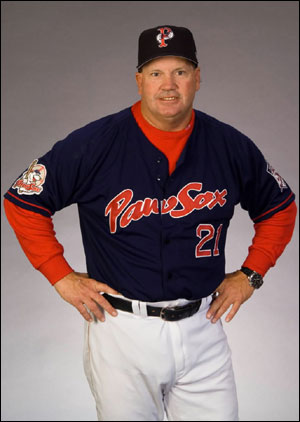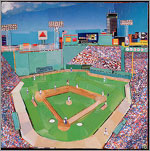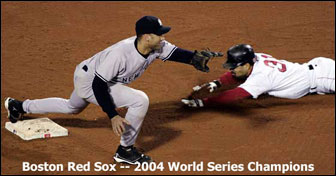Caretaker of the Future
FARM REPORT by Gary Jacobs
Caretaker of the Future
PAWTUCKET, RI | April 13, 2007-- It’s opening night in Pawtucket, and two hours before game time, McCoy Stadium is filling.
Fans in the blue general admission seats arrive early to stake their claim in the seats of their choice, which is almost completely pointless; there truly is no bad seat here, with the possible exception of the hundred or so seats for which the overhanging press box obstructs their view of the field.
The player/media parking lot is choked with police and fire honor guards, practicing their drills, making sure their shoes and badges are shined to a high gleam. In the public areas of the stadium, as well as the hidden hallways underneath the stands, the smell of new paint contends with the more traditional aromas of hot dogs and beer. McCoy is old – older than can be covered up by a coat of paint – but it is spotlessly clean, and that’s really all you can ask of a stadium that is older than most of the people in it.
On the field the PawSox are taking infield practice, and the man with the bat is no coach; it is the skipper of the team himself, Ron Johnson. As often as not there is a smile on his face, which is typical of RJ, as he is known; he is as far removed from the stereotypical crusty baseball lifer as it gets. Unfailingly positive and never one to deliver a message through the media, his players to a man enjoy playing for him.
“Well, I enjoy being their manager,” says Johnson. “Therefore I think it’ll maybe rub off and they enjoy playing for me. I don’t want to create an atmosphere where guys don’t want to be at the ballpark. If that goes hand in hand with wanting to play for me, then sure.”
***
Johnson was first drafted by the then-California Angels in the 13th round in 1976, but didn’t sign, opting instead to attend Fresno State University. After a standout collegiate career (first team All-American in 1978), he was drafted by Kansas City in the 24th round, thus beginning a tenure in professional baseball that is entering its 30th year.
His own major-league career was short-lived; it started with a September callup in 1982. “I’ll never forget that day [September 12], because it was in Anaheim, and I grew up in Garden Grove,” he remembers. “It was really neat for me because my Dad was in the stands. And he ended up passing away of prostate cancer…he was my biggest fan. It was obviously not a long career, so to be able to play your first game, have your first at-bat with your Dad in the stands, it was pretty special.”
After spending parts of the next two seasons in the bigs, playing mostly first base but spend some time in the outfield and even a few games catching, he was demoted by the Montreal Expos in 1984 and never saw Major League action again.
Johnson: “I spent ’85 in the minor leagues. I was in the twilight of a mediocre career. It was very obvious that my playing days were coming to an end. I got released by the Tigers in 86, got picked up by the White Sox and finished out the season there up in Buffalo. The next season I was just out…working in a carpet store.”
After ending the first phase of his career, he embarked on his second; after contacting John Schuerholz, who originally drafted him, he took a position as a part-time coach in the Royals farm system. By 1992 he had become the manager of the Single-A Baseball City Royals. He worked his way through the organization, eventually taking the helm of the triple-A Omaha squad just two years later.
A few minutes after infield practice winds up, the familiar voice of PA announcer Jim Martin (also the PA voice of the Boston Bruins and author of the ubiquitous “Whoo!” played after every goal) calls a start to the opening day proceedings by announcing the color guards from just about every city and town in Rhode Island and southeastern Massachusetts. They line up just off the infield grass in the short outfield and before long there are 40 US and state flags waving powerfully in unison toward first base. Martin asks for a moment of silence to honor the fallen, and a pipe and drum corps plays a mournful Amazing Grace. The stadium noise is reduced to a whisper; even inside the pressbox, everyone stands at a respectful silence.
Then Jim Rice and the mayor of Pawtucket throw out the first pitch, John Fogerty’s "Centerfield" erupts from the PA system, and the PawSox take the field. At 7:08, on a chilly 45-degree windy night, there is baseball in Pawtucket again – against the Scranton-Wilkes-Barre Yankees, no less.
Johnson sees his new pitcher, Runelvys Hernandez, induce three ground ball outs, one of which the beefy Hernandez fields himself, another of which required his busting to first base just ahead of speedy Yankee right-fielder Bronson Sardinha. The veteran Hernandez fields both plays cleanly and the inning is quickly over.
Johnson, who like most other Triple-A teams presides over a mix of veterans and young up-and-comers, places a high value on the veterans on his squad.
“There’s an expectation with being a veteran,” Johnson asserts. “I’ll treat a veteran with the respect he deserves, but it’s a two-way street. I do rely on those guys. As an organization we’ve done a nice job of acquiring veterans that are not only skilled physically, but can be positive influences in the clubhouse or on a trip. If you want to treat yourself, spend a little time with Alex Ochoa – Joe McEwing – Ed Rogers. Spend some time talking to them…they’re fun to be around.”
***
Hitting coach Mark Budaska pops his head into RJ’s office while this interview was being conducted, and asks about infield practice.
“Is Alex out there?” Johnson asks.
“Ochoa?” asks Budaska.
“Yeah,” says Johnson. “I wanted to tell him he was out today.” He looks at me. “I like to tell them in person.”
A few minutes later, Ochoa walks in to the office.
“I apologize,” starts Johnson. “I was going to tell you last night. I know you want to play every day, but...you understand, right?
Ochoa nods, seemingly none the worse for knowing he wouldn’t be playing today.
“Alright, kid,” Johnson says, and shakes his hand.
No wonder why his players like playing for him.
***
After ending the first phase of his career, he embarked on his second; after contacting John Schuerholz, who originally drafted him, he took a position as a part-time coach in the Royals farm system. By 1992 he had become the manager of the single-A Baseball City Royals. He worked his way through the organization, eventually taking the helm of the triple-A Omaha squad until he was fired in 1999 (“baseball happens,” muses Johnson).
After casting around for several months without getting any nibbles, fortune smiled on him – sort of. Fortune’s crooked smile landed him back in single-A ball, but Johnson was just happy to be working again.
“Here’s a funny story for you,” he says. “DeMarlo Hale – the third-base coach up in Fenway – he’s managing in Double-A [at the time, the Trenton Thunder]. Well, something happened. He was going to be the manager in Pawtucket, but I guess he stayed in Trenton. Well, he leaves to go to Texas, to manage their Triple-A team. Billy Gardner Jr moved up to double-A, which opened up the job in Sarasota. I always make sure to thank DeMarlo every spring, cause he’s responsible for me getting a World Series ring! [pantoming showing off a ring] Thanks,D!” he says, laughing.
As with the Royals organization, his managerial skills carried him to triple-A Pawtucket for the 2005 season, where he’s remained.
***
Hernandez, perfect through three and pitching with a 1-0 lead, runs into trouble in the fourth. Second baseman Joe McEwing is charged with a two-base error on a close play, preserving for the moment Hernandez’ no-hitter. Ground outs by Yankees Alberto Gonzalez and Bronson Sardinha plate the run without benefit of a hit. But with two outs, the next four batters go single, walk, single, home run, and before the stunned crowd can absorb it, the score is 5-1.
The following inning – bottom of the fourth – RJ comes out to his accustomed spot on the third base coaches’ box (no third base coach in the minors; that’s the skipper’s job) wearing a microphone. The local cable company is broadcasting the game tonight and chats with Johnson during the half-inning. Notwithstanding the newly-forged four-run deficit, RJ is his normal upbeat, avuncular self with his remarks.
As he talks strategy with broadcasters Dan Hoard and ex-Red Sox catcher Bob Montgomery, he catches the eye of Luis Jimenez on second and shakes his head aggressively. He explains the gesture with typical humor. “We have to make a decision whether Luis will go or not. Since I just shook my head, I’m guessing they know he’s staying.”
The pressbox, listening to RJ on the TV on the back wall, erupts in laughter.
***
Johnson is entering his 30th year in professional baseball. Asked about what’s different between then and now, Johnson becomes philosophical.
“You know what? The biggest change, for me, is that everything’s gone way up as far as money and that kind of stuff,” he muses. “But really, the purity of the game on the field – it’s the same. In the clubhouse with the guys, it’s still the same.”
What about Johnson himself?
“Well, for one thing, I got a brain,” he says, laughing. “For years I didn’t have one. Plus now I spend my time printing out lineups [instead of handwriting them] – I enjoy the technology the world has given us. But no, as far as the guys, it’s all the same.”
One other constant in the minor leagues is the desire of its players (and managers) to leave, and get the call up to The Show that they’ve dreamed about their whole lives. Managing that expectation – and the reality that, thus far, it hasn’t happened – can be a challenge.
“I know guys want to be in the big leagues,” says Johnson. “I know there was disappointment toward the end of the spring when some of the guys didn’t make it. But you can look at things one of two ways: You can either sit and mope on it, say ‘woe is me,’ or go out, make yourself better, and make it to the big leagues. That’s what we do here: put it right on the table. Hey, I want to be in the big leagues [too].”
***
As night descends the temperature takes a southward turn from chilly to downright cold. With the windchill it feels like 36 degrees by the eighth inning. The Pawsox bats have gone similarly cold, scoring no runs since the fourth. Players, managers, and umpires are all bundled up as much as their jobs will permit.
The game plods on. Besides the big fourth inning, offense is scant. The sixth inning turns into the seventh, then to the eighth, until finally, after three hours and seven minutes, the game is over. Final score, 6-2, Yankees.
After the game, the media crowds into RJ’s office. For a minor league team, there’s a media contingent that other teams in the International League might find abnormally large. Of course, they reckon without the power of Red Sox Nation. Add in the fact that it’s opening day and what would normally be three or four beat writers becomes a throng.
RJ, as usual, is convivial, even in defeat. Spotting a camera, he cracks wise, poking fun at his own appearance: “I better put my hat on for the cameras,” he says. “Make my head look smaller.”
Also as usual, he describes the glass as half-full: “I thought Runelvys threw the ball very well,” he says of the losing pitcher of tonight’s tilt. “We had that one inning where he misfired just a tick; if this guy was missing, it wasn’t by much. He got behind the big guy [Yankee left fielder Shelley Duncan] and he hit one out of the ballpark, and that was the game…and we couldn’t get the big knock to get us back in it. But it was a well-played game…you tip your hat to them and we’ll be back tomorrow.”
***
As manager of the Red Sox’ triple-A team, Johnson’s job is a critical one to the future of the franchise; the job that Johnson does to advance the skills and poise of his young charges will influence the team for years to come.
And lest one get the impression that RJ is all jocundity, he turns serious when asked about the balance between wanting to field a winner and the development of his charges.
“You never sacrifice development for personal gains,” he says, suddenly earnest. “if you’re a quality developer, if you’re loyal to your organization, you’ll do what you need to do for the betterment of that player, long term, and for the organization.” He starts thumping his desk with his finger with every word for emphasis. “You don’t sacrifice a player or the organization for anything in the now. It’s as simple as that.” He relaxes just a little. “But it was tough to do when I first started managing, because it was all about me. I could only evaluate myself on a win or a loss. If we won, I’d go home and say “I managed great.” I’m not saying I don’t want to win – I want to win 90 games! But I know what my job is.”
And it’s clear that it’s a job he loves, despite his desire for a big-league career. “Of course I want to manage in the big leagues,” he says, and pauses. “But am I fulfilled here? Absolutely. I love this job.”
-- Gary Jacobs, Boston Dirt Dogs contributor. E-mail Gary








